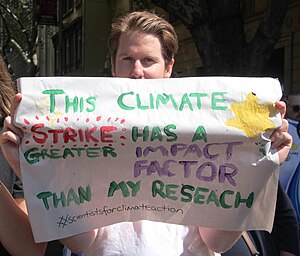
Reducing emissions[edit | edit source]
Although the emissions related to scientific research are a small fraction of the overall emissions, it has been argued that they should be reduced for several reasons:
- Scientists should avoid unnecessarily harming the environment, in the same way as they should avoir unnecessarily harming animals while doing research.[1]
- Scientists face a credibility gap when recommending reducing emissions if their own emissions are high.[1]
Low carbon campuses[edit | edit source]
The ecological footprint of low carbon campuses can be assessed both quantitatively and qualitatively.[2]
See also[edit | edit source]
References[edit | edit source]
- ↑ 1.0 1.1 Favaro, B. (2014-06-26). "A carbon code of conduct for science". Science (American Association for the Advancement of Science (AAAS)) 344 (6191): 1461–1461. doi:10.1126/science.344.6191.1461. ISSN 0036-8075.
- ↑ Liu, Hongbo; Wang, Xinghua; Yang, Jiangye; Zhou, Xia; Liu, Yunfeng (2017). "The ecological footprint evaluation of low carbon campuses based on life cycle assessment: A case study of Tianjin, China". Journal of Cleaner Production (Elsevier BV) 144: 266–278. doi:10.1016/j.jclepro.2017.01.017. ISSN 0959-6526.